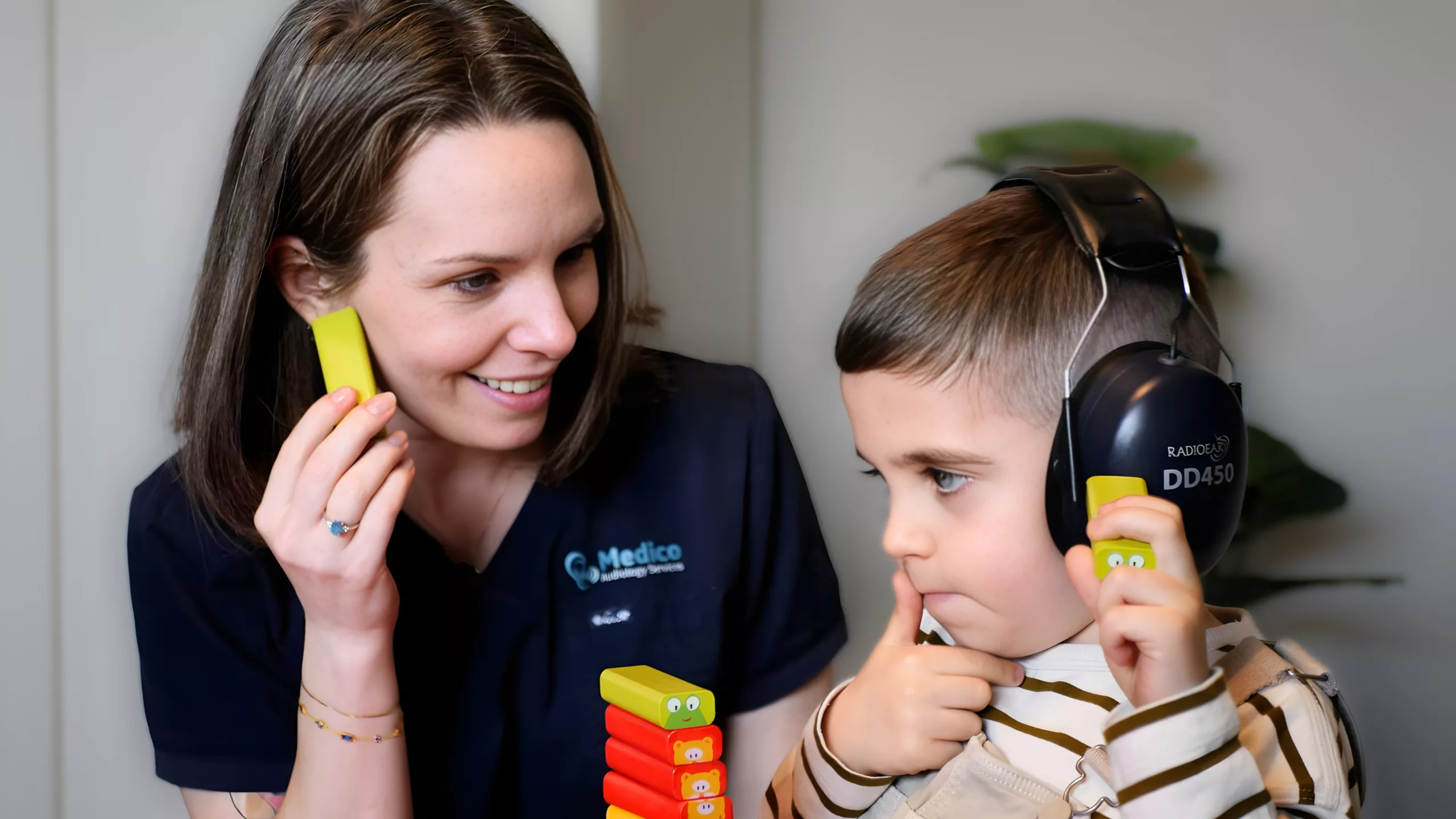Is Your Child Showing Signs of Hearing Difficulty?
If you’ve noticed your child not responding when called, frequently asking ‘What?’, complaining of ear pain, or struggling to understand conversations, it may be an indication of a hearing issue that requires attention. At our hearing clinic in Cork, we understand the importance of early intervention. Most hearing problems diagnosed during childhood are temporary, such as middle ear fluid.
Why Choose Us?
- We are Independent
- We are Highly Qualified
- We Follow Best Practice
- We provide Gold Standard Care
- We are Patient Centred
- We have a No Rush Attitude
- We have Clinics in Bishopstown, Cork and Clonmel
Call Now: 085 265 3136
Email: admin@medicoaudiology.ie
Fill out our contact form
Don’t hesitate to reach out to us if you have concerns about your child’s hearing. We offer diagnostic testing suitable for children aged 6 months and up at our Cork hearing clinic. Our team of experienced audiologists and paediatric specialists are trained to provide accurate assessments and personalised treatment plans for children with hearing issues. We believe in a holistic approach to care, ensuring that your child’s overall well-being is taken into consideration.
In addition to our esteemed hearing clinic in Cork, we also offer specialised services for children aged 5 and over in Clonmel. Our devoted team of experienced audiologists and paediatric specialists are available at both locations, ensuring hearing assessments tailored to the needs of young children.
What to expect at my child’s hearing test?
Otoscopy or Video-otoscopy
Otoscopy allows the visualisation and examination of the ear canal and ear drum.
Tympanometry (Suitable from Birth)
Tympanometry is a non-invasive test that examines middle ear function and the movement of the eardrum (tympanic membrane). By measuring the ear’s response to both sound and pressure, we generate a tympanogram, which provides insights into conditions such as middle ear fluid, abnormal air pressure, and more.
Otoacoustic Emissions (OAE’s) Testing (Suitable From: Birth)
OAE’s testing involves playing a soft sound and measuring the echo that returns. This test assesses the function of the outer hair cells in the inner ear (cochlea). It helps us rule out anything more severe than a mild cochlear hearing loss, providing us with vital information about your child’s hearing abilities.
Acoustic Reflexes (Suitable from Birth)
This test assesses the contraction of the stapedius muscle in response to loud sounds. By evaluating this reflex, we can gather valuable information about nerve function and determine the type and degree of hearing loss, whether conductive or sensorineural.
Visual Reinforcement Audiometry (VRA) (suitable from 6 months to 2–3 years)
For infants and toddlers too young for conventional tests, we employ Visual Reinforcement Audiometry (VRA). This method utilises specialised equipment to evaluate your child’s hearing. By strategically placing animations or lighted toys, we train your child to turn towards the source of sound, allowing us to gather crucial information about their hearing abilities.
If you’re interested in learning more about VRA, please feel free to contact our team and find out more about our Cork audiological services.
Performance or Play Audiometry (Suitable for: 2.5 years+)
Performance and Play Audiometry are engaging tests that evaluate hearing sensitivity at various pitches. Using sound-field speakers and headphones, your child responds through play to test tones. This interactive approach helps us accurately assess their hearing abilities.
Speech Discrimination Testing (Suitable From: 2 Years+)
This test evaluates your child’s ability to hear and understand speech. They may be asked to repeat words they hear or to identify toys or pictures associated with the spoken words. This test complements the overall assessment of your child’s hearing capabilities.
Your Questions Answered
How do I know if my child needs a hearing test?
Signs that your child may need a hearing test include delayed speech development, difficulty following conversations, frequently asking for repetition, inattentiveness, or turning up the volume on devices. If you have concerns about your child’s hearing, a test is recommended.
What happens during a paediatric hearing test?
Depending on your child’s age, we use age-appropriate techniques such as play audiometry, visual reinforcement audiometry, tympanometry, and speech testing to assess their hearing ability. Our audiologists create a comfortable and engaging environment to ensure accurate results.
How long does a paediatric hearing test take?
A full diagnostic hearing test for children usually takes between 30 to 60 minutes, depending on the child’s age and response. We ensure a relaxed approach to make the process as smooth and stress-free as possible.
What should I do if my child has hearing loss?
If a hearing loss is detected, we will discuss the next steps with you. This may include further medical evaluation, hearing aids, or early intervention strategies to support speech and language development. Our team will guide you through the best options for your child’s needs.
Do I need a referral for my child to have a hearing test?
No, a referral is not required. You can book a private paediatric hearing assessment directly through our online booking system or by contacting our clinic.
Get in touch with us today
At Medico Audiology Services private clinic in Cork and Clonmel, we are committed to providing thorough and accurate hearing assessments for all children. Early detection and intervention can make a significant difference in your child’s development and quality of life. Contact us today to schedule a children’s hearing test and ensure your child’s auditory health is in good hands. Our team of experienced audiologists will work closely with you to understand your child’s unique needs and provide personalised care. Book a private consultation at our Cork hearing clinic by clicking here to access our online booking system. Alternatively, you can call or write to us using the contact information below.


